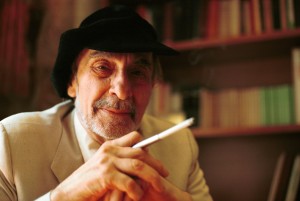One of the Greats – Unbeknownst to Them
Yesterday I was working on a special project that involved being in the Z Smith Reynolds Library. Even though it was just the second day of classes, students were already looking quite serious about finding a quiet place to study and do their work. While ZSR wasn’t full in the same way it is, say, during midterms or finals, it still seemed pretty well populated for day 2.
The finding of your best study space is a big deal in college. For some students it needs to be a quiet place, isolated from other distractions. For others, they need some constant movement and visuals to keep them alert. I settled in yesterday afternoon – along with 8-10 students – in the Mandelbaum Reading Room on the 4th floor of the ZSR. The nice thing about this room is that it is bright (a whole wall of windows), quiet (glass doors close it in), and a bit remote. You have to be intentional to get here. For many, an ideal nook for studying.
As you walk in the glass doors, there are big letters above announcing it as the Mandelbaum Reading Room. If I polled all 8-10 students in this room and asked them “Who was Allen Mandelbaum?”, I’d bet you a tenner that none of them would know. And they shouldn’t necessarily know him by name. He passed away in 2011, so he was not one who taught any of your students.
While they might not know him by name, if your students ever read any of Dante’s Divine Comedy, it is almost certain that they read Allen Mandelbaum’s translation. Or Homer’s Odyssey. Or Ovid’s Metamorphoses. He was the extraordinary talent behind an astonishing list of classics that were beautifully, masterfully translated.
This man, simply put, was a giant in the intellectual world.
As I look around the room, I see posters and citations, awards, medals. Some of the most acclaimed awards and recognitions in the intellectual world – both in the US and from Italy – are referenced or represented here. I was lucky enough to have Dr. Mandelbaum during my time at Wake Forest. I took him for Dante I and II way back in the 90s and it was an experience like no other. He was older, often sporting a beret and a long, ebony cigarette holder which he fingered often but never lit. He had a rich voice and you could tell as soon as he opened his mouth that this was a man on a different intellectual plane. Sometimes listening to him talk I was lost, other times amazed, other times inspired.
He had the kind of career that could have placed him at other universities where he would be a showpiece, a great name for the administration to be proud of but students would never be in class with, where he could think and write only and that would be enough. But he was here. And he taught undergraduates. And you didn’t have to be an English major or pre-PhD or anything. If you were interested in Dante, that was enough. You got 90 minutes with the world’s most revered Dante scholar. The best living mind anywhere on this subject.
Stunning.
I don’t fault today’s students for not knowing Dr. Mandelbaum, or for not spending time looking at each and every poster and medal in this room. They are all in here studying and doing what they should be doing: managing time wisely, doing homework, etc.
But part of me wishes they would all stop a few minutes and just look at this room – and other public spaces on campus – and look at the art, the posters, think about the names they see and what they did. Who they were, and what they meant to the world.
 This is a great article about his life and his tremendous, legendary body of work.
This is a great article about his life and his tremendous, legendary body of work.
